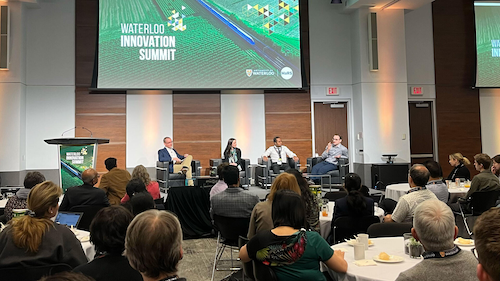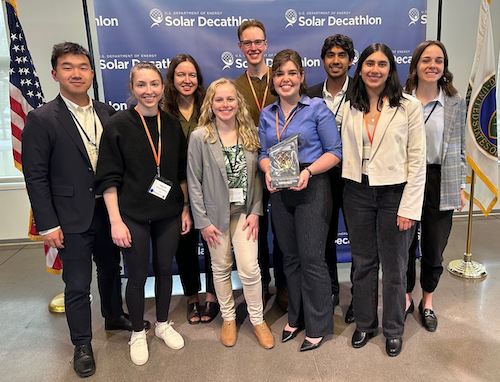Editor:
Brandon Sweet
University Communications
bulletin@uwaterloo.ca
Sustainable innovation needs societal change

By Stephanie Longeway. This is an excerpt of an article originally published on Waterloo News.
“The climate crisis is our biggest existential threat,” said the University of Waterloo’s President, Vivek Goel, in his opening address at the Waterloo Innovation Summit on Friday, April 21.
It’s no coincidence that the Summit, centred on sustainable transportation, took place on the eve of Earth Day.
The calls and commitments to reduce our carbon emissions have never been louder, but our global energy related CO2 emissions continued to climb in 2022.
“Innovation is essential. We will not meet the targets for carbon neutrality without technologies that do not exist today,” Goel continued. “We also know that it is not just technology alone [that will be the solution]. We need the right sets of policies and regulations. We also need to think about behavioural patterns and adoption of new technologies. That’s where collaborations and connections across disciplines will be important to think about these issues.”
This half-day event was hosted by the University of Waterloo, in partnership with MaRS Discovery District, who welcomed almost 200 sustainable transportation experts and innovators to the MaRS Centre in downtown Toronto.
The setting was also no coincidence. MaRS, like the University of Waterloo’s Velocity and commercialization programs, helps to accelerate innovation into business solutions for global impact and economic growth.
Yung Wu, CEO of MaRS Discovery District told the audience that Canada has an opportunity to make a global impact through the innovation economy. “The talent and intellectual property being developed at academic institutions and being flowed through to innovation hubs to commercialize … that’s the launch pad to achieve success in Canada.”
Wu added that in addition to talent and commercialization ecosystems, coalitions and collaborations between institutions will help to launch new technologies and break down the barriers of behavior patterns and policy that Vivek noted as an imperative for change.
Innovation is an essential solution — if it's adopted
“Technological adoption needs to be done in conjunction with technological progress,” said Markus Moos, director of the School of Planning at Waterloo. He was part of a panel on infrastructure, policy and access for sustainable travel.
The panel discussed the connection between land use and transportation. Currently, many of Canada’s communities and infrastructure are designed around personal vehicle travel. Markus noted that in communities that design and subsidize sustainable systems, like public transportation or more rail options, you see people switch behaviours and adopt new models for travel. “What we subsidize as a society is ultimately the choice framework people will operate in.”
This theme was reiterated in the panel discussion on the mass adoption of electric vehicles (EVs). The moderator Tyler Hamilton, senior director of climate at MaRS said that creating infrastructure like more charging stations and optimizing power grid efficiency to support more EVs on the road will be the hurdle to counteract “range anxiety”.
Mabel Fulford, director of Innovation Partnership at Peak Power is hopeful and reports that adoption is growing fast along with demand. “The utility sector will be forced to keep up.”
Having the support of regulators is also an important factor that came up in the panel discussion on Canadian made innovations.
Ribbit uses pilotless flight technology to create a more robust supply chain by deploying small autonomous airplanes that fly cargo shipments into remote communities. Jeremy Wang, COO and co-founder said that when he first started out, he had thought regulatory issues would be the biggest hurdle but soon discovered that Transportation Canada was really supportive. The Velocity company has since flown test flights with Transport Canada’s approval to demonstrate proof of concept.
Remi Desa, CEO and co-founder of Pantonium, has found government adoption one of the biggest hurdles for his on-demand transit model. Pantonium is a MaRS backed company and offers a solution for municipal transit systems. He said that municipalities are slow adopters because they are risk adverse and not use to working with new, smaller companies. They found success working with a bold municipality, Fort Erie. This successful case has opened the door to more municipalities willing to attempt something new.
Working together with government partners and commercialization hubs, these businesses have been able to bring their innovations to market to benefit of the environment, economy and society.
This theme of connectivity and cross-disciplinary collaboration was top of mind for many speakers and guests at the Summit. Attendees came from all sectors across Canada including private companies, researchers from academia and institutes, all three levels of government and community organizations.
It will take all of these groups, working together, to make meaningful change and encourage technology adoption.
Coalitions, connections and collaborations
There may be no better example of collaboration than the Waterloo Institute for Sustainable Aeronautics (WISA). It is the worlds’ leading hub for sustainable aviation and aerospace research, technology and education. Its focus is on interdisciplinary inquiry, cross-sector partnerships and experiential learning to build a sustainable future for the sector.
As Goel noted in him opening remarks, “it is easy to suggest we just need to reduce transportation,” but the pandemic showed us that there is a human need to be with others and travel will always be a part of our future."
Read the full article on Waterloo News.
Waterloo wins prize at energy-efficient home contest

Members of Warrior Home (l-r) Richard He, Isabel Crant, Adriana Ceric, Anna van der Heide, Pierre Roy, Renee Champion, Asjad Khan, Talina Sen Smet and Rebecca Damsteegt pose with their award at the Solar Decathlon in Colorado.
A student design team from the University of Waterloo took home one of the top prizes from an international competition to design and build highly energy-efficient homes.
Warrior Home, which is made up primarily of engineering undergraduate students, finished first in the engineering category, one of 10 categories at the Solar Decathlon Build Challenge sponsored by the U.S. Department of Energy.
Winners in the two-year contest, which featured university teams from as far afield as Vietnam, India and Australia, were announced at a showcase event in Golden, Colorado this weekend.
The Waterloo team, which includes more than 50 members, is redesigning and retrofitting a 130-year-old house in Kitchener to become a net-zero, energy-efficient home for an Indigenous family.
The project was undertaken in partnership with the Kitchener-Waterloo Urban Native Wigwam Project (KWUNWP). Work on the two-storey house, which was donated to the KWUNWP by Waterloo Region after sitting vacant for several years, is expected to cost about $150,000.
Fifty-seven teams qualified for the finals, with Ball State University in Indiana finishing first overall, followed by the Indian Institute of Technology Bombay.
Tuesday's notes
Graduate Studies and Postdoctoral Affairs (GSPA) has announced that the planned in-person Ask Me Anything event, scheduled for Thursday, April 27, has been postponed.
GSPA recommends attending today's virtual Ask Me Anything event, which is scheduled to take place from 10:30 a.m. to 12 noon.

The Department of Classical Studies will host the two-day workshop Ethnicity and Ethnic Constructs in the Long History of the Ancient Mediterranean and Black Sea this week.
"Rather than a static or natural form of belonging, ethnicity is an ongoing site of social production and negotiation," says the event abstract. "It can be both the source and the product of identity. Our workshop will explore how ancient societies defined, constructed, and leveraged ethnic belonging. How did (or does) ethnicity work alongside other social categories, political exigencies, and cultural imaginations? What is changing about our traditional historical questions, if anything, when ethnicity is foregrounded in the analysis? Case studies will range from Archaic Greek colonization over Herodotus’ representation of the Persians, representations of wise men and pirates, Hellenistic Judaism, the iconography of others in Roman Egypt, and Christian concepts of identity in the Later Roman Empire."
The event will take place in the German Reading Room (ML 245) on Wednesday, April 26 and Thursday, April 27.
Link of the day
When and Where
Fitness and Personal Training - Registrations opened January 5 this winter with Personal Training and Small Group Training as well as a Free Warrior Workout Program.
Waterloo Warriors Youth Camps. Spring and Summer camps available for Boys and Girls ages 5-18. Baseball, Basketball, Football, Volleyball, Hockey and Multi-Sport and Games. Register today.
Student Health Pharmacy in the basement of the Student Life Centre is now offering Covid booster shots (Pfizer and Moderna) and flu shots. Call 519-746-4500 or extension 33784 for an appointment. Walk-ins always welcome.
Final examination period,Thursday, April 13 to Friday, April 28.
Call for Expressions of Interest: Canada Biomedical Research Fund and Biosciences Research Infrastructure Fund (CBRF-BRIF), due Thursday, April 27. Learn more about the process.
Share how you experience the UWaterloo campus in the Inclusive Physical Space Framework survey for a chance to win a $50.00 on a WatCard. Survey closes midnight on Friday, April 28. Please note the deadline extension.
Ask me anything about graduate studies at the University of Waterloo (virtual), Tuesday, April 25, 10:30 a.m.
2SLGBTQIA+ Fundamentals, Tuesday, April 25, 1:00 p.m. to 4:00 p.m., online.
Just Relationships for Research Panel, Tuesday, April 25, 1:15 p.m.
NEW - Ethnicity and Ethnic Constructs in the Long History of the Ancient Mediterranean and Black Sea, Wednesday, April 27 and Thursday, April 27, German Reading Room (ML 245).
Geopolitical turmoil and its implications for the technology landscape, Wednesday, April 26, 12 noon, online.
Pathways to Addressing (with Care) Disclosures of Racism | Students, Wednesday, April 26, 1:00 p.m. to 4:00 p.m.
W3+ Meet and Greet + Trivia Lunch, "Why should grad students join Waterloo Womxn + Nonbinary Wednesdays?" Wednesday, April 26, 12 noon, Graduate House.
When and Where to get support
Students can visit the Student Success Office online for supports including academic development, international student resources, immigration consulting, leadership development, exchange and study abroad, and opportunities to get involved.
Instructors looking for targeted support for developing online components for blended learning courses, transitioning remote to fully online courses, revising current online courses, and more please visit Agile Development | Centre for Extended Learning | University of Waterloo (uwaterloo.ca).
Faculty, staff, post-doc and graduate student instructors can find upcoming teaching and learning workshops, self-directed modules and recordings of previous events on Centre for Teaching Excellence Workshops and Events page.
Instructors can access the EdTech Hub to find support on Waterloo’s centrally supported EdTech tools. The Hub is supported by members of IST’s Instructional Technologies and Media Services, Centre for Teaching Excellence, Centre for Extended Learning and subject matter experts from other campus areas.
Supports are available for employees returning to campus. Visit IST’s Hybrid Work and Technology guidelines and workplace protocols to assist with the transition.
Students with permanent, temporary and suspected disabilities and disabling conditions (medical conditions, injuries, or trauma from discrimination, violence, or oppression) can register with AccessAbility Services for academic accommodations (classroom accommodations, testing accommodations, milestone accommodations).
Instructors can visit AccessAbility Services' Faculty and Staff web page for information about the Instructor/Faculty role in the accommodation process. Instructors/Faculty members are legally required to accommodate students with disabilities. AccessAbility Services (AAS) is here to help you understand your obligations, and to offer services and resources to help you facilitate accommodations.
Did you know that the Writing and Communication Centre offers many in-person and virtual services to support you with any writing or communication project? This term we've added The Write Spot: a new student space in South Campus hall, complete with bookable workspaces, drop-ins with our peer tutors, and free coffee and tea. We also have one-to-one appointments with our writing and communication advisors and peer tutors, email tutoring for grads and undergrads, drop-ins at Dana Porter Library, online workshops, writing groups, English conversation practice, and even custom in-class workshops. For any communication project, the Writing and Communication Centre is here to support you.
Research Ethics: Find yourself with an ethical question, unsure if your work requires an ethics review, or need advice about putting together a research ethics application? Reach out to one of our friendly staff by booking a consultation or email us with your questions.
Co-op students can get help finding a job and find supports to successfully work remotely, develop new skills, access wellness and career information, and contact a co-op or career advisor.
The Centre for Career Action (CCA) has services and programs to support undergrads, grad students, postdocs, alumni, and employees in figuring out what they value, what they’re good at, and how to access meaningful work, co-op, volunteer, or graduate/professional school opportunities. Questions about CCA's services? Live chat, call 519-888-4047, or stop by our front desk in the Tatham Centre 8:30 a.m. to 4:30 p.m., Monday to Friday.
Drop-in to in-person Warrior Study Halls on Thursdays from 5:00 p.m. to 6:30 p.m. in DC and DP. Join a Peer Success Coach to set goals and work independently or in groups each week.
Renison's English Language Institute continues to offer virtual events and workshops to help students practice their English language skills.
If you feel overwhelmed or anxious and need to talk to somebody, please contact the University’s Campus Wellness services, either Health Services or Counselling Services. You can also contact the University's Centre for Mental Health Research and Treatment. Good2Talk is a post-secondary student helpline available to all students.
The Library is here to help, both in person and online. Our spaces are open for access to book stacks, study spaces, computers/printers, and the IST Help Desk. For in-depth support, meet one-to-one with Librarians, Special Collections & Archives and Geospatial Centre staff. Visit the Library’s home page to access our online resources for anywhere, anytime learning and research.
The Faculty Association of the University of Waterloo (FAUW) continues to advocate for its members. Check out the FAUW blog for more information.
The University of Waterloo Staff Association (UWSA) continues to advocate for its members. Check out the UWSA blog for more information.
The Office of Equity, Diversity, Inclusion & Anti-racism (EDI-R) works with students, faculty and staff across campus to advance equity and anti-racism through evidence-based policies, practices and programs. If you have a concern related to anti-racism and/or equity, please complete our intake form.
The Sexual Violence Prevention and Response Office (SVPRO) supports all members of the University of Waterloo campus community who have experienced, or been impacted, by sexual violence. This includes all students, staff, faculty and visitors on the main campus, the satellite campuses, and at the affiliated and federated Waterloo Institutes and Colleges. For support, email: svpro@uwaterloo.ca or visit the SVPRO website.
The Office of Indigenous Relations is a central hub that provides guidance, support, and resources to all Indigenous and non-Indigenous campus community members and oversees the University's Indigenization strategy.
The Waterloo Indigenous Student Centre, based at United College, provides support and resources for Indigenous students, and educational outreach programs for the broader community, including lectures, and events.
WUSA supports for students:
Peer support - MATES, Glow Centre, RAISE, Women’s Centre - Click on one of the links to book an appointment either in person or online for the term.
Food Support Service food hampers are currently available from the Turnkey Desk 24/7 in the Student Life Centre. Drop-off locations are also open again in SLC, DC, DP, SCH, and all residences.
Co-op Connection all available online.
Centre for Academic Policy Support - CAPS is here to assist Waterloo undergraduates throughout their experience in navigating academic policy in the instances of filing petitions, grievances and appeals. Please contact them at caps@wusa.ca.
WUSA Student Legal Protection Program - Seeking legal counsel can be intimidating, especially if it’s your first time facing a legal issue. The legal assistance helpline provides quick access to legal advice in any area of law, including criminal. Just call 1-833-202-4571.
Empower Me is a confidential mental health and wellness service that connects students with qualified counsellors 24/7. They can be reached at 1-833-628-5589.
GSA-UW supports for graduate students:
The Graduate Student Association (GSA-UW) supports students’ academic and social experience and promotes their well-being.
Advising and Support - The GSA advises graduate students experiencing challenges and can help with navigating university policies & filing a grievance, appeal, or petition.
Mental Health covered by the Health Plan - The GSA Health Plan now has an 80 per cent coverage rate (up to $800/year) for Mental Health Practitioners. Your plan includes coverage for psychologists, registered social workers, psychotherapists, and clinical counselors.
Dental Care - The GSA Dental Plan covers 60 to 70 per cent of your dental costs and by visiting dental professionals who are members of the Studentcare Networks, you can receive an additional 20 to 30 per cent coverage.
Student Legal Protection Program - Your GSA fees give you access to unlimited legal advice, accessible via a toll-free helpline: +1-833-202-4571. This advice covers topics including housing disputes, employment disputes, and disputes with an academic institution.
The Graduate House: Open Monday to Tuesday 11:30 a.m. to 7:00 p.m. and Wednesday to Friday 11:30 a.m. to 9:00 p.m. We’re open to all students, faculty, staff, and community members. The Graduate House is a community space run by the GSA-UW. We’re adding new items to the menu. Graduate students who paid their fees can get discounts and free coffee.